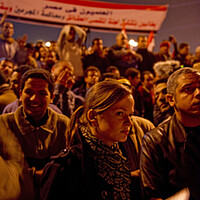Egypt to hold early presidential election, as loyalists rally at revolutionary landmark
Loading...
| Cairo
Egypt will hold presidential elections before a parliamentary vote, Egypt's interim president said Sunday, amending a transition plan previously established by the military after it seized power last July amid mass protests.
The announcement by interim President Adli Mansour came one day after at least 49 people died in clashes with police on the third anniversary of an uprising against former President Hosni Mubarak. Under Egypt's new Constitution, an election should be held by mid-April.
An early presidential poll is widely seen as a boost for Gen. Abdel Fattah al-Sisi, the Army chief, who has suggested that he would run for president if given a mandate by the people. Yesterday, many Egyptians came out on the symbolic day to do just that, as authorities demonstrated that dissenting views were not welcome in a country that has taken a sharply authoritarian turn since the removal of elected President Mohamed Morsi last July.
The military cordoned off Tahrir Square, the epicenter of the 2011 revolution, and guarded the entrances where Egyptians – many carrying posters of Sisi – lined up to enter the square.
Elsewhere, the police moved quickly to crush protests against the military and the interim government, whether by supporters of Mr. Morsi's now-outlawed Muslim Brotherhood or secular activists. Police arrested 1,079 people, according to state media, including activists who were detained before protests even began.
Many of the activists who led the 2011 uprising that forced Mr. Mubarak to resign are now in prison, along with thousands of members of the Brotherhood and others arrested for protesting in what rights activists say is a systematic campaign to silence dissent.
In a televised address, Mr. Mansour said Saturday's pro-government rallies were evidence that the state and the people were “adamant to eradicate terrorism and implement the road map for the future,” referring to the military's transition plan. He condemned a string of attacks on Friday against security forces, including a powerful car bomb that killed four people, and vowed to “eradicate” terrorism. “We will not hesitate to undertake any exceptional measure if necessary," he said.
Mansour said he had asked the head of the appeals court to assign more judges to terrorism cases and speed up their resolution. He also asked the public prosecutor to review cases of detainees, “especially university students,” and to release those held without charges for whom there's no evidence that they committed a crime.
A 'real man' as president
At a pro-Sisi rally near the presidential palace, the atmosphere was festive, with music blaring and vendors selling T-shirts with pictures of the general. Hundreds of demonstrators switched between chants calling on Sisi to run for president or praising the police and military, and asking for the “execution” of the Muslim Brotherhood.
Many Egyptians at the rally said they had come to ask Sisi to throw his hat into the political ring. “For the time being, he's the only one who can take this country forward, because he is a strong decisionmaker,” says Anad Lamloum. Her cousin Heba al-Saady says she initially opposed a presidential run by Sisi, but changed her mind after Friday's bombing. “We need a real man” to be president of Egypt, she argues. “Someone with courage and wisdom, a guy who has heart.”
Elsewhere, police fired tear gas and birdshot to break up antigovernment protests across the city. The Brotherhood-led Anti Coup Alliance had announced 34 locations for protests across Cairo; most were quickly swarmed by police, who were in some places joined by civilians.
At one protest called in opposition both to the Brotherhood and the military-backed government, several hundred people turned out. Protesters there said they had not lost hope for democratic change despite the bleak outlook for their brand of political activism. An hour later, police moved in, scattering demonstrators and sparking clashes.






